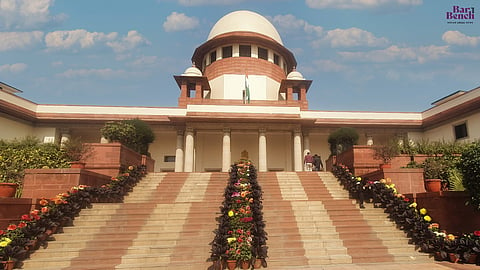
- News
- Columns
- Interviews
- Law Firms
- Apprentice Lawyer
- Legal Jobs
- हिंदी
- ಕನ್ನಡ

The Supreme Court recently held that under Section 143A of the Negotiable Instruments Act (NI Act), an accused who fails to deposit interim compensation cannot be denied the right to cross-examine the witnesses examined on behalf of the complainant [Noor Mohammed v. Khurram Pasha].
A three-judge bench of Justices UU Lalit, S Ravindra Bhat and Sudhanshu Dhulia was hearing an appeal challenging the decision of the Karnataka High Court which had upheld the conviction order passed by the trial court against the appellant under Section 138 of the NI Act.
By way of background, the trial court had taken cognizance of a complaint moved by the respondent against the appellant with regard to dishonor of cheque under Section 138.
During the course of hearing, the trial court had directed the appellant to deposit 20 per cent of the cheque amount as interim compensation in terms of Section 143A of the NI Act within 60 days. However, the appellant failed to deposit the same.
When the matter was taken-up for examination of witnesses, an application was made on behalf of the appellant under Section 145(2) of the NI Act seeking permission to cross-examine the respondent. However, in view of his failure to deposit the interim compensation, the application was dismissed and the trial court later convicted the appellant.
The High Court also upheld the order of the trial court leading to the present appeal before the Supreme Court.
Before the apex court, the appellant argued that though the order of interim compensation in terms of Section 143A of the NI Act is not complied with, the amount can be recovered in terms of sub-section (5) of Section 143A, but it would not be within the competence of the court to deprive an accused of his right to cross-examine a witness.
The Court agreed with the submissions of the appellant, and took the view that the provision of Section 143A of the NI Act nowhere contemplates that an accused who fails to deposit interim compensation could be fastened with any other disability including denial of right to cross-examine the witnesses examined on behalf of the complainant.
"Any such order foreclosing the right would not be within the powers conferred upon the court and would, as a matter of fact, go well beyond the permissible exercise of power," the Court observed.
Since the right to cross-examine the respondent was denied to the Appellant, the decisions rendered by the courts below suffer from an inherent infirmity and illegality, the top court said while allowing the appeal.
[Read Judgment]